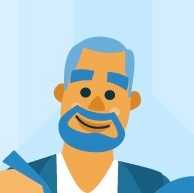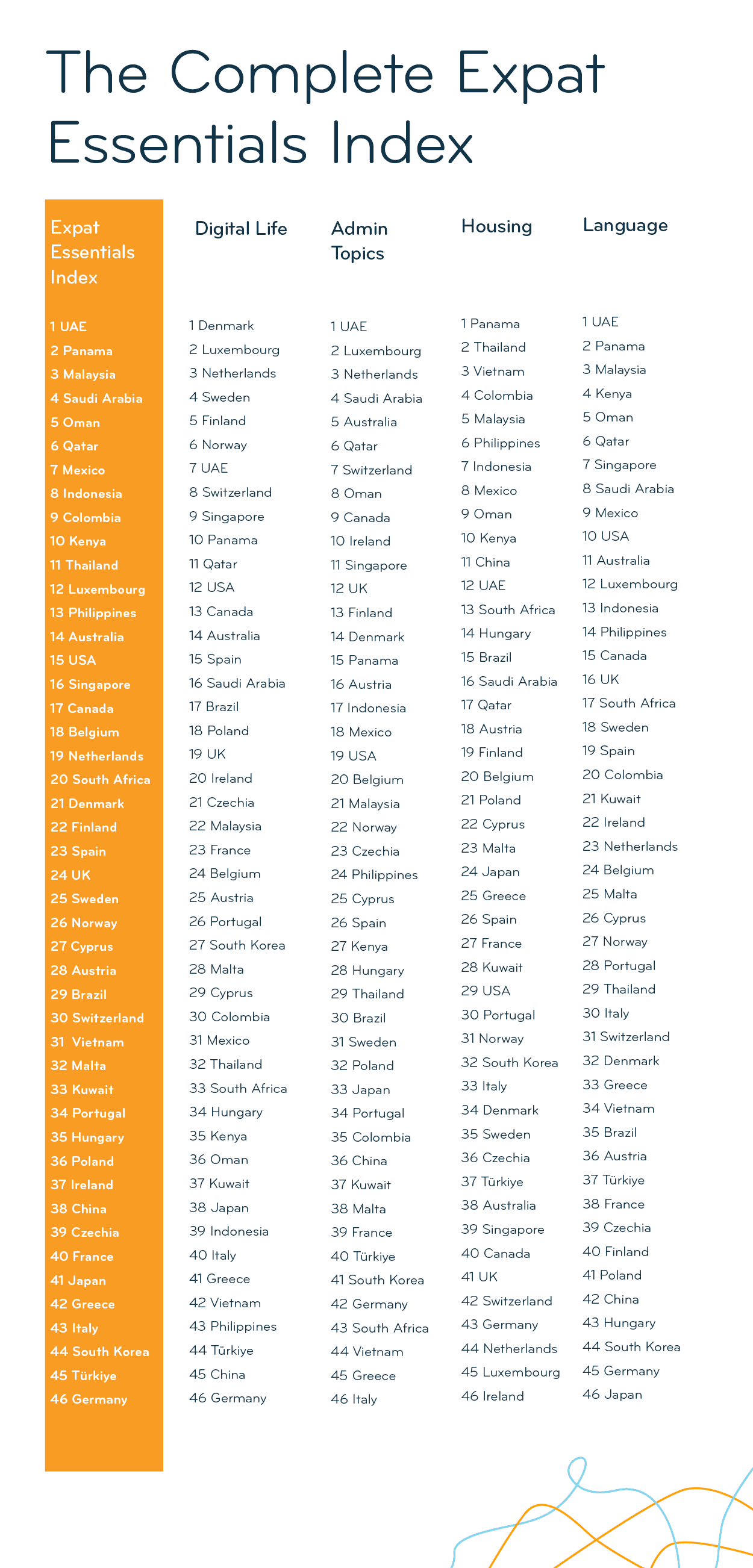
Where It’s (Not So) Easy to Manage the Basics of Life Abroad
Paperwork, housing, language barriers, and more: countries in the Middle East continue to make it easy for expats to handle the essentials. And among the top 3, there’s a notable newcomer.
- Methodology
- Easy Going in the UAE (1st)
- First for Housing: Panama (2nd)
- No Language Barriers in Malaysia (3rd)
- Cash Is Still King in Germany (46th)
- Winding Bureaucracy in Türkiye (45th)
- Language Woes in South Korea (44th)
- Trends in the Top 10
- Trends in the Bottom 10
- The Biggest Winners for Expat Essentials
- The Biggest Losers for Expat Essentials
- Full Ranking
- Further Reading
- External Resources
The Top 10

Methodology
The Expat Essentials Index is based on four subcategories with two to four underlying factors each:
Digital Life considers the restrictiveness of online services in general, the online availability of administrative and government services specifically, as well as the availability of high-speed internet and the ease of paying without cash.
The Admin Topics Subcategory looks at how easy respondents say it is to deal with local bureaucracy, open a bank account in their new home, or get a visa in the first place.
The ease of learning the local and/or official language(s) in an expats’ new home, and whether it’s difficult to live there without speaking it, is summarized in the Language Subcategory.
And lastly, the Housing Subcategory reflects housing affordability and how easy it is to find.
Respondents rated these points on a scale of one (very bad / disagree completely) to seven (very good / agree completely).
To be included in the ranking, a country needs a minimum of 50 respondents. In 2025, 46 destinations met this threshold.
Easy Going in the UAE (1st)
For the second year in a row, the UAE places 1st in the Expat Essentials Index.
Expats have no trouble getting by in the UAE without speaking the local language (1st) and agree it’s not difficult to get a visa to move there (1st). Bureaucracy in general is not a big issue: close to two-thirds (65%) find it’s easy to deal with the local authorities, a notable contrast to the global average of 37%.
Access to high-speed internet (4th) and the availability of online admin services (1st) surely helps: 61% of respondents in the UAE rate the latter as very good (vs. 24% globally).


However, not every digital topic delights: two-thirds of respondents (67%) agree that access to online services such as social media is unrestricted. Worldwide, a much larger share of 83% say the same about their host country, with the UAE thus ranking in the bottom 10 for this factor (42nd).
Luckily, housing is much less of an issue. Expats agree it’s comparatively affordable (18th) as well as easy to find (8th). More than double the global average give the latter point the best possible rating (38% vs. 17% globally).
First for Housing: Panama (2nd)
For the third year in a row, Panama lands in the top 10 of the Expat Essentials Index — this time on the podium, placing 2nd.
Expats praise the country for nearly every aspect of the index. Panama’s “worst” result is an average 30th place for the online availability of administrative services. Other aspects of the Digital Life Subcategory delight: over nine in ten respondents agree it’s easy to get high-speed internet access (91% vs. 80% globally); pay without cash (97% vs. 85%); and enjoy unrestricted access to online services like social media (92% vs. 83%).
Panama also stands out for the ease of getting a visa (5th) and, most notably, for Housing (1st). More than double the global average rate the affordability of accommodation positively (71% vs. 34%), with close to three in ten respondents (28%) giving it the best possible rating (vs. 11% globally). And an even higher share (90%) point out it’s easy to find, too (vs. 44% globally).
Lastly, Panama ranks 2nd in the Language Subcategory. Over three in five expats (63%) agree it’s not difficult to live there without speaking the local language, compared to less than half the survey respondents worldwide (47%). A similar share (64%) find it easy to learn (vs. 39% globally). Though to be fair, for close to a quarter of respondents in Panama (23%), Spanish is already their native language.
No Language Barriers in Malaysia (3rd)
Malaysia continues to experience ups and downs in the Expat Essentials Index. Following 4th place in 2023, the country fell out of the top 10 to rank 13th in 2024. A year later, it’s grabbed a spot on the podium, ranking 3rd.
The Southeast Asian country continues to offer expats affordable (4th) and easily available (10th) housing, with more than a third of respondents (36%) giving the affordability of accommodation the best possible rating (vs. 11% globally).
Malaysia does even better in the Language Subcategory (3rd). Close to three-quarters (74%) agree it’s easy to live there without speaking the local language (vs. 47% globally), though less than a third (32%) consider it easy to learn (vs. 39%). Due to the country’s colonial history, English is widely spoken, especially in business and the media.1


Malaysia does less well in other areas of the Expat Essentials Index, though its 21st and 22nd place in the Admin Topics and Digital Life Subcategories, respectively, reflect above-average results.
Cash Is Still King in Germany (46th)
For the fourth year in a row, Germany places last in the Expat Essentials Index (46th out of 46 destinations) — with bottom 10 placements across all four subcategories.
Germany continues to struggle with a lack of fast fiber-optic internet connections and digitalization of its services.2 This is also noted by expats: over 42% rate the availability of online admin services negatively, twice the global average of 21%. And compared to 80% globally, just 56% agree it’s easy to get high-speed internet access at home.
Combined with a last place for cashless payment options, it’s hardly surprising that Germany once again comes last in the Digital Life Subcategory (46th).


It’s not only the lack of online services that makes handling admin topics tricky. Close to two-thirds (65%) rate the German bureaucracy negatively (vs. 41% globally) — around a third (32%) even give it the worst possible rating (vs. 16%).
Results for Language (45th) aren’t much better. Two-thirds (67%) find German difficult to learn, compared to 41% of all respondents who say the same about their host country’s local language. Indeed, close to three in five expats (58%) share they worried about the language barrier prior to moving to Germany (vs. 32% globally).
Finally, Germany places 43rd for Housing. While costs are high (37th), the actual search seems to be a bigger issue. Over three in five respondents in Germany (63%) say it’s difficult to find housing (vs. 36% globally).
Winding Bureaucracy in Türkiye (45th)
Türkiye is the second-worst performing country in the Expat Essentials Index (45th).
Major pain points are the lack of high-speed internet (45th) and restricted access to online services like social media (45th). Despite this, an average share of respondents rate the availability of administrative services online positively (58% vs. 59% globally).
Not that this means there’s little red tape. In fact, only a fifth (20%) agree it’s easy to deal with the local authorities and bureaucracy (vs. 37% globally). And less than half (46%) say the same about opening a local bank account (vs. 62% agreeing globally).


Accommodation in Türkiye is neither simple to find (44% negative ratings vs. 36% globally) nor easy to afford (60% vs. 48%).
And the language barrier was a worry prior to expats’ relocation to Türkiye, at least according to 54% of respondents (vs. 32% globally). The country’s bottom 10 placement in the Language Subcategory (37th) seems to prove them right.
Language Woes in South Korea (44th)
South Korea has never done particularly well in the Expat Essentials Index. But its 44th place in 2025 is its first time in the bottom 10.
The underlying results present a mixed picture: expats appreciate South Korea for the ease of cashless payment options (18th) and rank it 1st for its high-speed internet. However, while connections are quick, online services like social media aren’t necessarily unrestricted (38th) and admin tasks can’t always be done online (35th).
Or maybe those services are only available in Korean? The local language is something expats struggle with, with the country placing 44th in the respective subcategory. More than half (53%) disagree it’s easy to live in South Korea without local language skills (vs. 34% globally), and close to two-thirds (64%) find it difficult to learn (vs. 41%). Unsurprisingly, the language barrier was a major concern prior to the move (58% vs. 32% globally).
Last but not least, only around a quarter (26%) agree it’s easy for expats to find accommodation (vs. 44% globally). And a similar share (24%) considers it affordable, 10 percentage points below the global average of 34%.
Trends in the Top 10
- UAE
- Panama
- Malaysia
- Saudi Arabia
- Oman
- Qatar
- Mexico
- Indonesia
- Colombia
- Kenya
Compared to 2024, only two countries are new in the top 10 of the Expat Essentials Index: Malaysia (3rd) and Colombia (9th).
As in 2024, a fair share of the best countries in the index can be found in the Middle East: the UAE (1st) is joined by Saudi Arabia (4th), Oman (5th), and Qatar (6th), while 2024’s second-placed Bahrain simply didn’t have enough respondents to feature in the 2025 ranking.
Expats in these destinations benefit from a lack of red tape — Oman’s 8th place in the Admin Topics Subcategory is the “worst” result here — and readily available housing. Worldwide, only 44% of respondents agree it’s easy for expats to find accommodation. In these four destinations agreement is notably higher, ranging from 56% to 68%.
What’s more, expats consider it easy to live in these countries even without speaking Arabic: the UAE (1st), Oman (2nd), and Qatar (5th) place in the top 5 for this point, with Saudi Arabia a bit behind (16th). The bad news? All four destinations rank in the bottom 10 when it comes to unrestricted access to online services.
Indonesia (8th) joins Malaysia (3rd) in representing Southeast Asia in the index. Like Malaysia, Indonesia stands out for affordable (6th) and easily available (7th) housing. Results in the Admin Topics (17th) and Language (13th) Subcategories aren’t quite as good, but still above average. What keeps Indonesia from ranking even higher? Expats’ dissatisfaction with Digital Life (39th), including the availability of online admin services (just 41% positive ratings vs. 59% globally).
Three Latin American destinations have made it into the top 10: next to Panama (2nd), there’s Mexico (7th) and Colombia (9th). Admin Topics might not delight — ranking 35th, Colombia only just escapes the bottom 10 for this subcategory — but respondents appreciate housing, with all three countries ranking in the top 10 for this topic.
Plus, picking up Spanish doesn’t seem be much of an issue: around three in five expats in Mexico (59%) and Panama (64%) agree learning the local language is easy. In Colombia, the share is even higher at 71%, compared to a global average of just 39%.
Geographically the odd one out, Kenya (10th) ranks in the top 10 of the index for the fourth year running. Expats report few language struggles (4th in the respective subcategory) and appreciate the available housing: two-thirds (66%) agree it’s easy to find, with 39% even giving this point the best possible rating (vs. a global 44% and 17%, respectively).
Trends in the Bottom 10
- Ireland
- China
- Czechia
- France
- Japan
- Greece
- Italy
- South Korea
- Türkiye
- Germany
Like the top 10, the bottom 10 have seen little change. Only South Korea (2024: 36th out of 53; 2025: 44th out of 46) and Ireland (43rd vs. 37th) are new in this list.
Six of the ten countries can be found in Europe: in addition to Germany (46th), there’s Italy (43rd), Greece (42nd), France (40th), Czechia (39th), and Ireland (37th). Among the six, only Ireland stands out well for Admin Topics, ranking 10th while all the others except for Czechia (23rd) can be found in the bottom 10 for this subcategory. Ireland in turn is dragged down by its last place in the Housing Subcategory (46th).
Digital Life is an issue in Germany (46th), Greece (41st), and Italy (40th), in large part due to a lack of cashless payment options; hard-to-get high-speed internet; and limited online admin services. France and Czechia, meanwhile, lose ground due to bad results in the Language Subcategory, ranking 38th and 39th, respectively — though for different reasons! Around three-quarters of expats in Czechia (76%) find the local language difficult to learn (vs. 41% globally), while just a quarter of respondents in France (25%) agree it’s easy to live there without speaking French (vs. 47%).
South Korea (44th), Japan (41st), and China (38th) represent Asia in the bottom 10. The language is a notable hurdle, with Japan ranking last for this subcategory. Language problems may also tie into expats’ dissatisfaction with Admin Topics. For example, worldwide 62% of respondents agree that opening a local bank account is easy. In these three countries, this share is 40% or less.
Opinions differ when it comes to the accommodation search. While South Korea (38th) and Japan (39th) place in the bottom 10 for this factor, China (12th) is closer to the top 10. Similarly, results in the Digital Life Subcategory vary widely: South Korea places 1st for high-speed internet, China 41st; China ranks 7th for cashless payment options, Japan lands in the bottom 10 (44th).
The Biggest Winners for Expat Essentials
After three years in the bottom 10 of the Expat Essentials Index, Malta (32nd) jumped 16 places in 2025. Expats there are still very dissatisfied with how difficult it is to open a local bank account (45th out of 46 in 2025). But the country has seen a 22-place improvement when it comes to the ease of getting a visa (from 31st to 9th). In early 2024, Malta launched the so-called Specialist Employee Initiative as an additional visa option for highly skilled individuals3 that might have helped here.
The country has also made notable gains when it comes to finding housing (43rd to 19th): in 2024, two in five expats (40%) disagreed it was easy. In 2025, only 25% maintain this negative view.
With its 17th place in 2025, Canada finally seems to be at the end of its downward trend in the index: while it ranked 10th in 2022, results in 2023 (20th) and 2024 (31st) were much less positive. Nearly every factor of the index receives better ratings in 2025, though general trends that were already visible in previous years remain the same: learning the local language is easy (4th), it’s difficult to get a visa (41st), and housing remains expensive (40th).
However, finding housing seems slightly less of an issue now: in 2024, more than half the respondents in Canada (53%) rated this factor negatively. While still high, this share is down 10 percentage points at 43% in 2025.
The Biggest Losers for Expat Essentials
South Korea is not only one of the worst performing countries in the index (see details above), it’s also the biggest loser in the 2025 Expat Essentials Index, falling from 36th place out of 53 destinations in 2024 to rank 44th out of 46 in 2025.
Especially in the Admin Topics Subcategory, the country has lost a lot of ground (from 27th to 41st in 2025). And the housing search seems to have grown more difficult in South Korea: the share of respondents who agree it’s easy for expats to find housing has dropped from 39% in 2024 to just 26% a year later.
Housing, specifically the affordability of it, is a reoccurring issue in Singapore, the second-biggest loser in the index (from 9th down to 16th). But interestingly, results have somewhat improved in the Housing Subcategory (from 47th to 39th). The same can’t be said for the rest of the index, though.
For example, the share of expats who agree it’s easy to get a visa for Singapore has dropped by 10 percentage points, from 59% in 2024 to 49% in 2025. The country introduced several changes to its visa system in 2024, including a ban on the use of employer of records to sponsor work permits.4
Full Ranking

Further Reading
- The Best & Worst Countries for Expats in 2025
- Long Hours for a Great Life in the UAE
- Expats in Panama Are Happiest with Their Life Abroad
- Expats Struggle to Settle in Germany
- Türkiye’s Economic Woes Spill Over into Society
- Amid a Turbulent Political Climate, South Korea Slips to the Bottom
- Expat Insider 2024: Where It’s Easy to Get Started with the Essentials Abroad
External References
Advertisement
Join InterNations
The community for expats worldwide
Download

